Hospitality Industry: Sectors, Economic Contribution, and Growth
VerifiedAdded on 2020/10/23
|9
|2628
|335
Report
AI Summary
This report provides a comprehensive analysis of the contemporary hospitality industry, encompassing various sectors such as lodging, food and beverage, travel and tourism, and entertainment. It delves into the significant contributions of the industry to economic growth at local, national, and global levels, highlighting the impact of direct and indirect contributions, particularly through tourism and employment. The report examines the influence of franchising and licensing on the industry's expansion, emphasizing their roles in stimulating economic activity and facilitating business growth. Furthermore, it explores the operational and functional departments within the hospitality sector, focusing on the required skills for employees, including front office executives, operational leaders, customer relation managers, and marketing executives. The report also addresses the skill gaps and shortages prevalent in the industry, such as communication, technical knowledge, and customer handling, and emphasizes the importance of training and teamwork to overcome these challenges and ensure long-term success. The report concludes by underscoring the vast growth opportunities within the hospitality sector and the necessity of skilled employees for the industry's success.
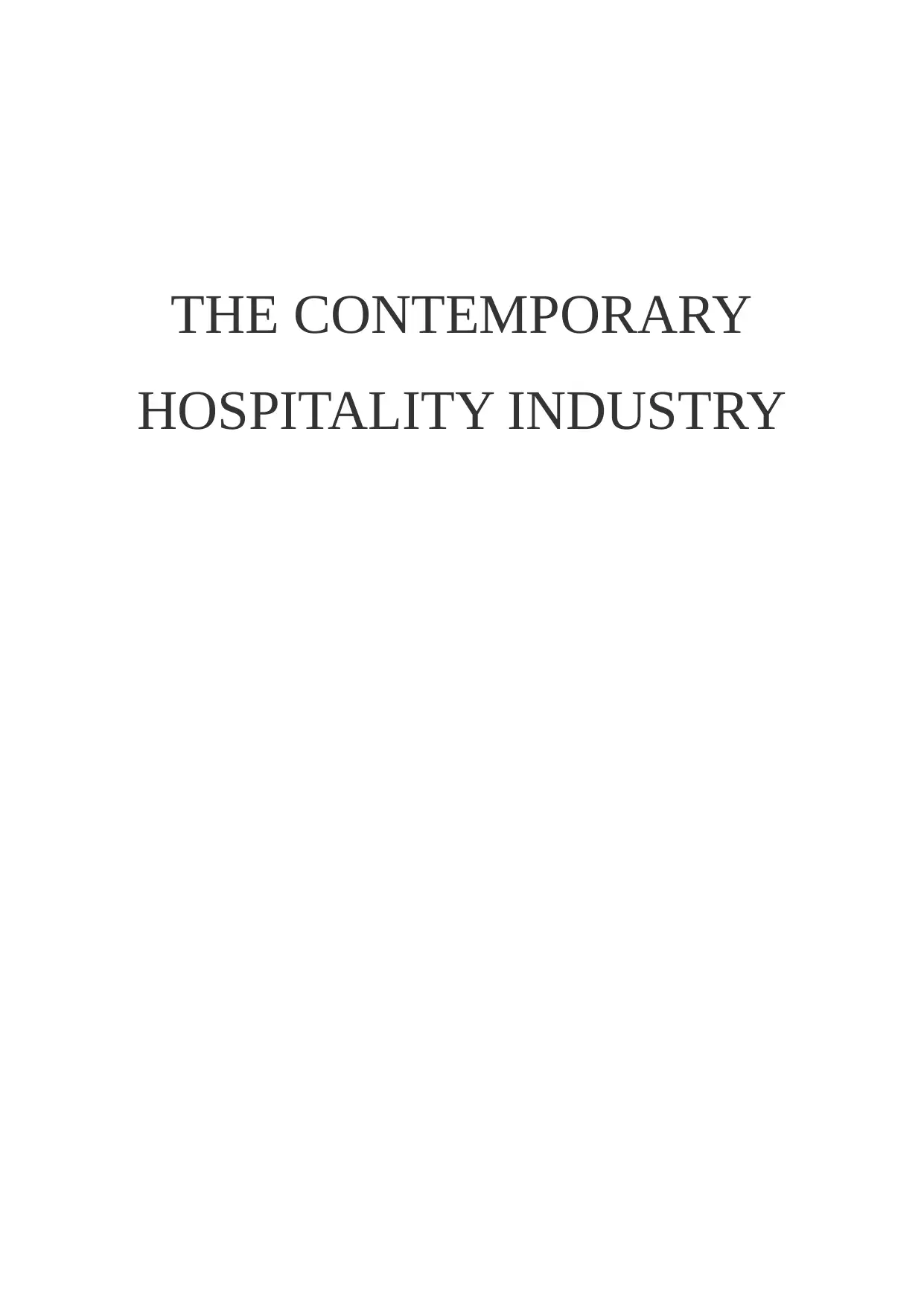
THE CONTEMPORARY
HOSPITALITY INDUSTRY
HOSPITALITY INDUSTRY
Paraphrase This Document
Need a fresh take? Get an instant paraphrase of this document with our AI Paraphraser
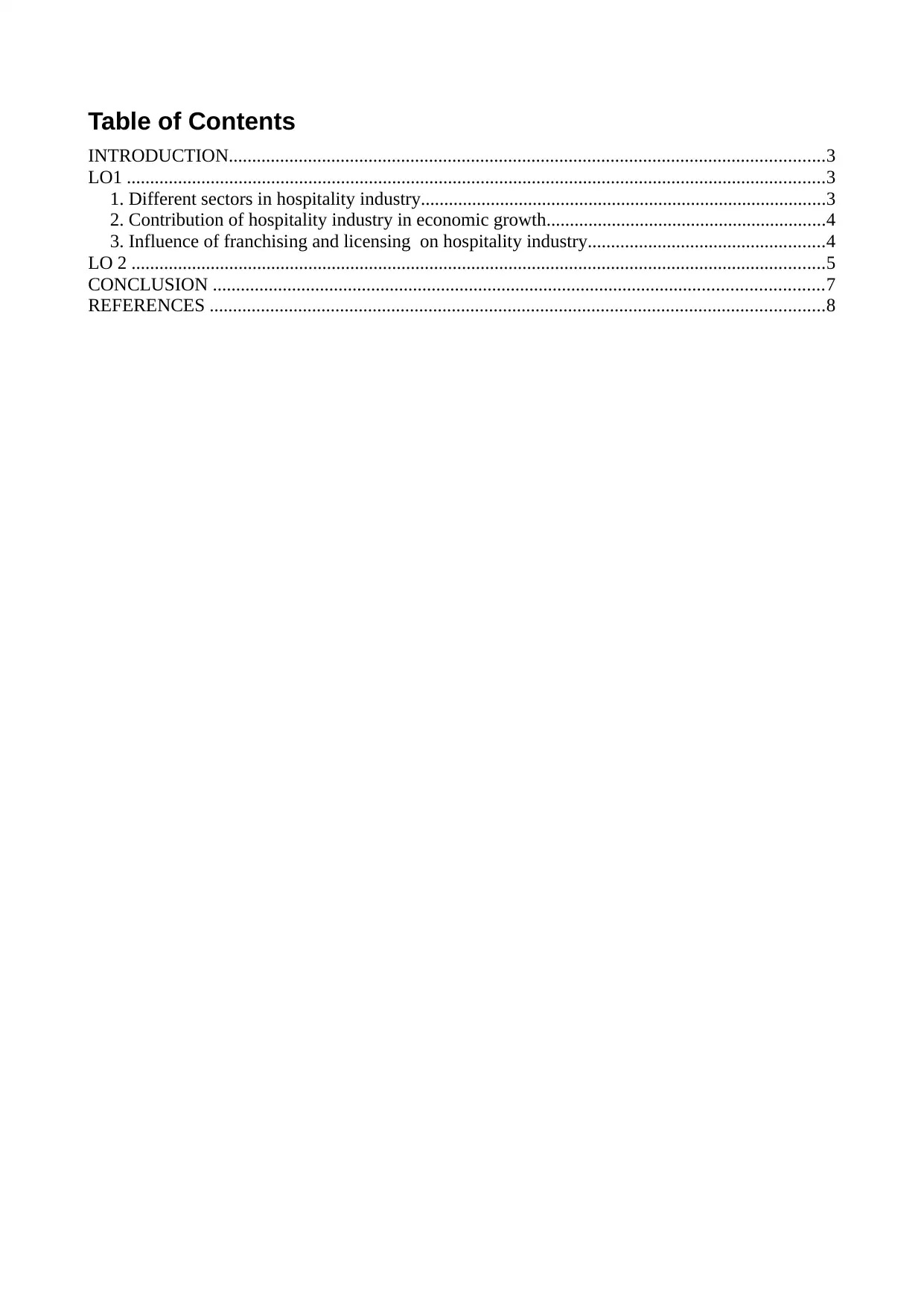
Table of Contents
INTRODUCTION................................................................................................................................3
LO1 ......................................................................................................................................................3
1. Different sectors in hospitality industry.......................................................................................3
2. Contribution of hospitality industry in economic growth............................................................4
3. Influence of franchising and licensing on hospitality industry...................................................4
LO 2 .....................................................................................................................................................5
CONCLUSION ...................................................................................................................................7
REFERENCES ....................................................................................................................................8
INTRODUCTION................................................................................................................................3
LO1 ......................................................................................................................................................3
1. Different sectors in hospitality industry.......................................................................................3
2. Contribution of hospitality industry in economic growth............................................................4
3. Influence of franchising and licensing on hospitality industry...................................................4
LO 2 .....................................................................................................................................................5
CONCLUSION ...................................................................................................................................7
REFERENCES ....................................................................................................................................8
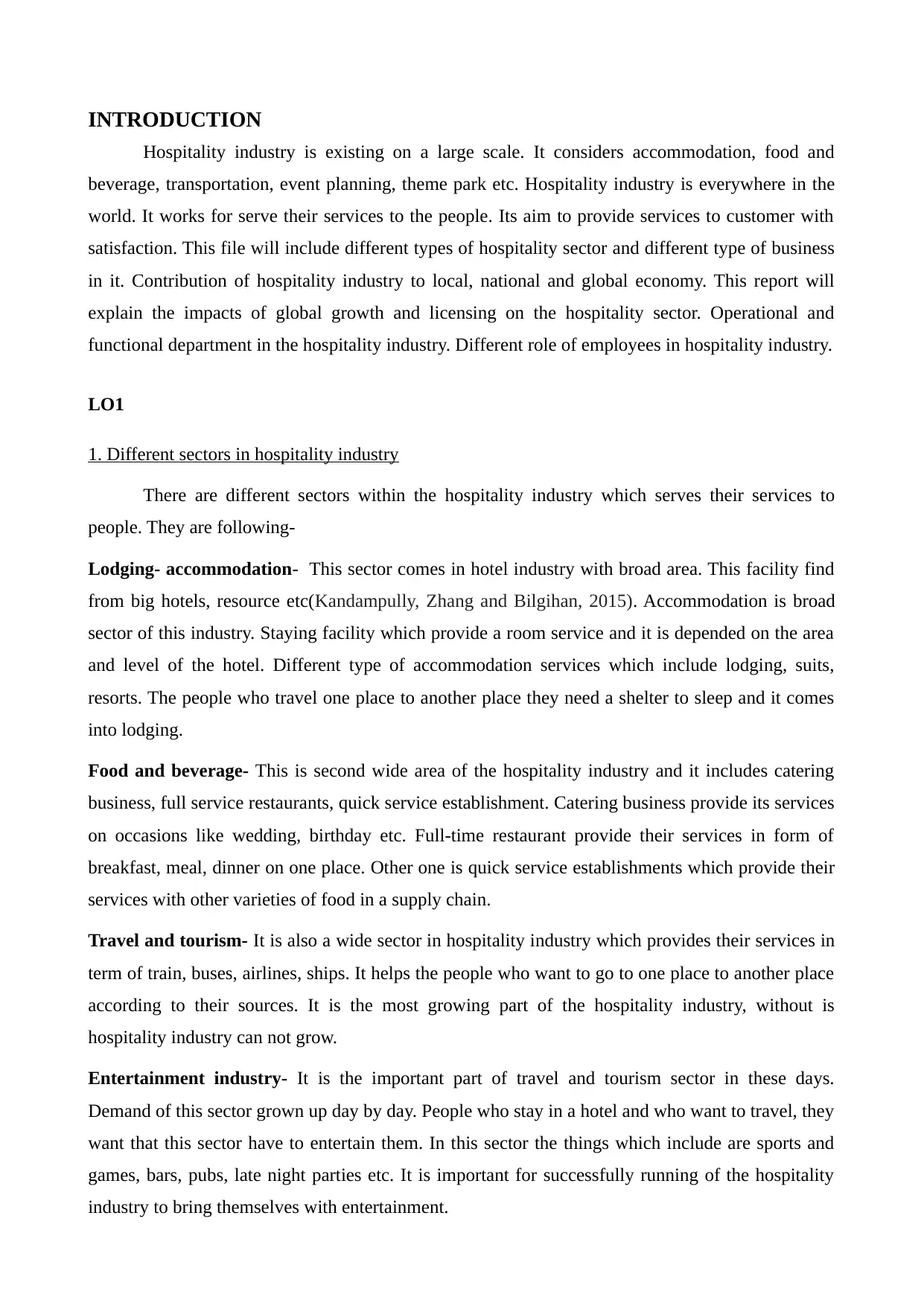
INTRODUCTION
Hospitality industry is existing on a large scale. It considers accommodation, food and
beverage, transportation, event planning, theme park etc. Hospitality industry is everywhere in the
world. It works for serve their services to the people. Its aim to provide services to customer with
satisfaction. This file will include different types of hospitality sector and different type of business
in it. Contribution of hospitality industry to local, national and global economy. This report will
explain the impacts of global growth and licensing on the hospitality sector. Operational and
functional department in the hospitality industry. Different role of employees in hospitality industry.
LO1
1. Different sectors in hospitality industry
There are different sectors within the hospitality industry which serves their services to
people. They are following-
Lodging- accommodation- This sector comes in hotel industry with broad area. This facility find
from big hotels, resource etc(Kandampully, Zhang and Bilgihan, 2015). Accommodation is broad
sector of this industry. Staying facility which provide a room service and it is depended on the area
and level of the hotel. Different type of accommodation services which include lodging, suits,
resorts. The people who travel one place to another place they need a shelter to sleep and it comes
into lodging.
Food and beverage- This is second wide area of the hospitality industry and it includes catering
business, full service restaurants, quick service establishment. Catering business provide its services
on occasions like wedding, birthday etc. Full-time restaurant provide their services in form of
breakfast, meal, dinner on one place. Other one is quick service establishments which provide their
services with other varieties of food in a supply chain.
Travel and tourism- It is also a wide sector in hospitality industry which provides their services in
term of train, buses, airlines, ships. It helps the people who want to go to one place to another place
according to their sources. It is the most growing part of the hospitality industry, without is
hospitality industry can not grow.
Entertainment industry- It is the important part of travel and tourism sector in these days.
Demand of this sector grown up day by day. People who stay in a hotel and who want to travel, they
want that this sector have to entertain them. In this sector the things which include are sports and
games, bars, pubs, late night parties etc. It is important for successfully running of the hospitality
industry to bring themselves with entertainment.
Hospitality industry is existing on a large scale. It considers accommodation, food and
beverage, transportation, event planning, theme park etc. Hospitality industry is everywhere in the
world. It works for serve their services to the people. Its aim to provide services to customer with
satisfaction. This file will include different types of hospitality sector and different type of business
in it. Contribution of hospitality industry to local, national and global economy. This report will
explain the impacts of global growth and licensing on the hospitality sector. Operational and
functional department in the hospitality industry. Different role of employees in hospitality industry.
LO1
1. Different sectors in hospitality industry
There are different sectors within the hospitality industry which serves their services to
people. They are following-
Lodging- accommodation- This sector comes in hotel industry with broad area. This facility find
from big hotels, resource etc(Kandampully, Zhang and Bilgihan, 2015). Accommodation is broad
sector of this industry. Staying facility which provide a room service and it is depended on the area
and level of the hotel. Different type of accommodation services which include lodging, suits,
resorts. The people who travel one place to another place they need a shelter to sleep and it comes
into lodging.
Food and beverage- This is second wide area of the hospitality industry and it includes catering
business, full service restaurants, quick service establishment. Catering business provide its services
on occasions like wedding, birthday etc. Full-time restaurant provide their services in form of
breakfast, meal, dinner on one place. Other one is quick service establishments which provide their
services with other varieties of food in a supply chain.
Travel and tourism- It is also a wide sector in hospitality industry which provides their services in
term of train, buses, airlines, ships. It helps the people who want to go to one place to another place
according to their sources. It is the most growing part of the hospitality industry, without is
hospitality industry can not grow.
Entertainment industry- It is the important part of travel and tourism sector in these days.
Demand of this sector grown up day by day. People who stay in a hotel and who want to travel, they
want that this sector have to entertain them. In this sector the things which include are sports and
games, bars, pubs, late night parties etc. It is important for successfully running of the hospitality
industry to bring themselves with entertainment.
⊘ This is a preview!⊘
Do you want full access?
Subscribe today to unlock all pages.

Trusted by 1+ million students worldwide
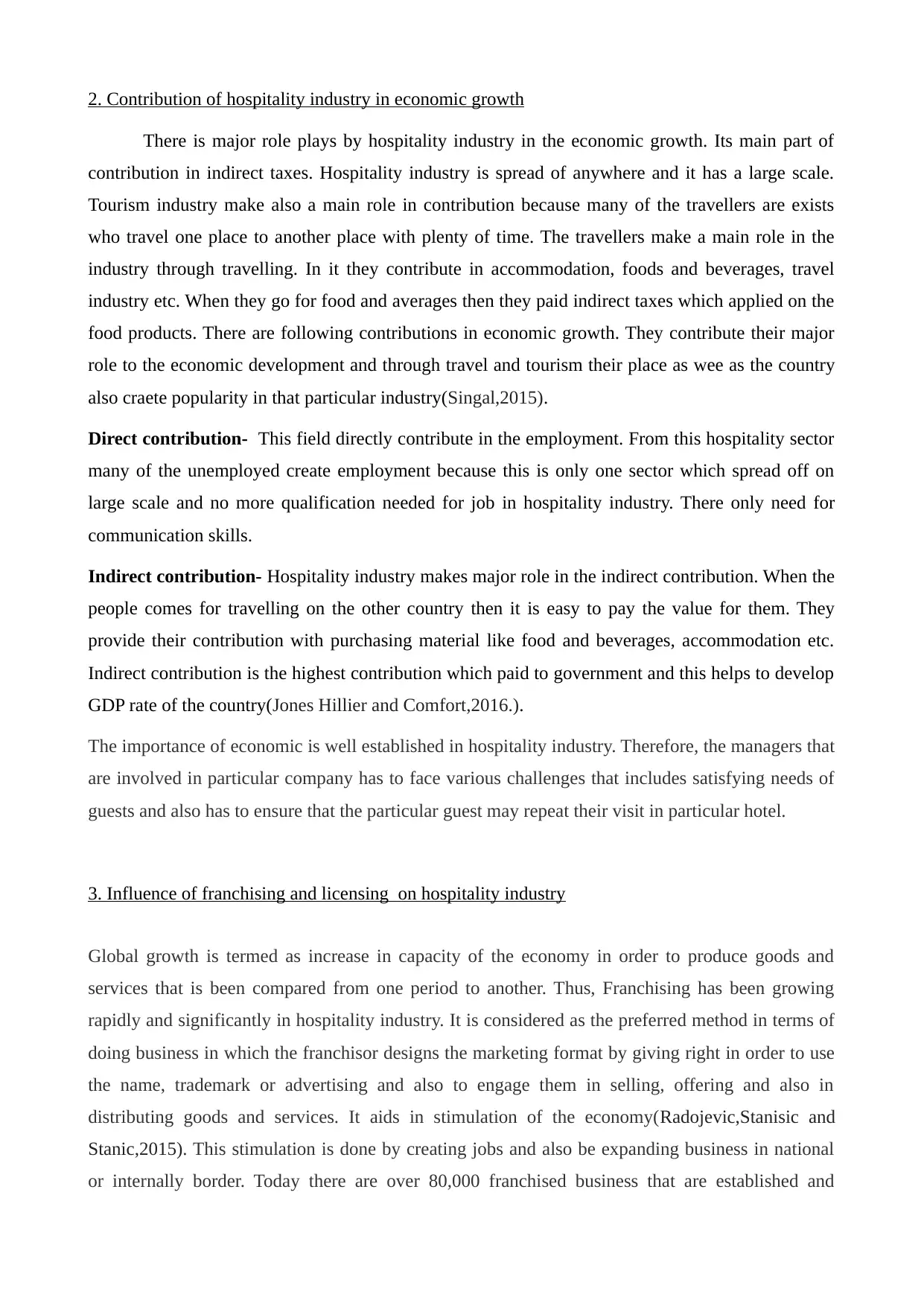
2. Contribution of hospitality industry in economic growth
There is major role plays by hospitality industry in the economic growth. Its main part of
contribution in indirect taxes. Hospitality industry is spread of anywhere and it has a large scale.
Tourism industry make also a main role in contribution because many of the travellers are exists
who travel one place to another place with plenty of time. The travellers make a main role in the
industry through travelling. In it they contribute in accommodation, foods and beverages, travel
industry etc. When they go for food and averages then they paid indirect taxes which applied on the
food products. There are following contributions in economic growth. They contribute their major
role to the economic development and through travel and tourism their place as wee as the country
also craete popularity in that particular industry(Singal,2015).
Direct contribution- This field directly contribute in the employment. From this hospitality sector
many of the unemployed create employment because this is only one sector which spread off on
large scale and no more qualification needed for job in hospitality industry. There only need for
communication skills.
Indirect contribution- Hospitality industry makes major role in the indirect contribution. When the
people comes for travelling on the other country then it is easy to pay the value for them. They
provide their contribution with purchasing material like food and beverages, accommodation etc.
Indirect contribution is the highest contribution which paid to government and this helps to develop
GDP rate of the country(Jones Hillier and Comfort,2016.).
The importance of economic is well established in hospitality industry. Therefore, the managers that
are involved in particular company has to face various challenges that includes satisfying needs of
guests and also has to ensure that the particular guest may repeat their visit in particular hotel.
3. Influence of franchising and licensing on hospitality industry
Global growth is termed as increase in capacity of the economy in order to produce goods and
services that is been compared from one period to another. Thus, Franchising has been growing
rapidly and significantly in hospitality industry. It is considered as the preferred method in terms of
doing business in which the franchisor designs the marketing format by giving right in order to use
the name, trademark or advertising and also to engage them in selling, offering and also in
distributing goods and services. It aids in stimulation of the economy(Radojevic,Stanisic and
Stanic,2015). This stimulation is done by creating jobs and also be expanding business in national
or internally border. Today there are over 80,000 franchised business that are established and
There is major role plays by hospitality industry in the economic growth. Its main part of
contribution in indirect taxes. Hospitality industry is spread of anywhere and it has a large scale.
Tourism industry make also a main role in contribution because many of the travellers are exists
who travel one place to another place with plenty of time. The travellers make a main role in the
industry through travelling. In it they contribute in accommodation, foods and beverages, travel
industry etc. When they go for food and averages then they paid indirect taxes which applied on the
food products. There are following contributions in economic growth. They contribute their major
role to the economic development and through travel and tourism their place as wee as the country
also craete popularity in that particular industry(Singal,2015).
Direct contribution- This field directly contribute in the employment. From this hospitality sector
many of the unemployed create employment because this is only one sector which spread off on
large scale and no more qualification needed for job in hospitality industry. There only need for
communication skills.
Indirect contribution- Hospitality industry makes major role in the indirect contribution. When the
people comes for travelling on the other country then it is easy to pay the value for them. They
provide their contribution with purchasing material like food and beverages, accommodation etc.
Indirect contribution is the highest contribution which paid to government and this helps to develop
GDP rate of the country(Jones Hillier and Comfort,2016.).
The importance of economic is well established in hospitality industry. Therefore, the managers that
are involved in particular company has to face various challenges that includes satisfying needs of
guests and also has to ensure that the particular guest may repeat their visit in particular hotel.
3. Influence of franchising and licensing on hospitality industry
Global growth is termed as increase in capacity of the economy in order to produce goods and
services that is been compared from one period to another. Thus, Franchising has been growing
rapidly and significantly in hospitality industry. It is considered as the preferred method in terms of
doing business in which the franchisor designs the marketing format by giving right in order to use
the name, trademark or advertising and also to engage them in selling, offering and also in
distributing goods and services. It aids in stimulation of the economy(Radojevic,Stanisic and
Stanic,2015). This stimulation is done by creating jobs and also be expanding business in national
or internally border. Today there are over 80,000 franchised business that are established and
Paraphrase This Document
Need a fresh take? Get an instant paraphrase of this document with our AI Paraphraser
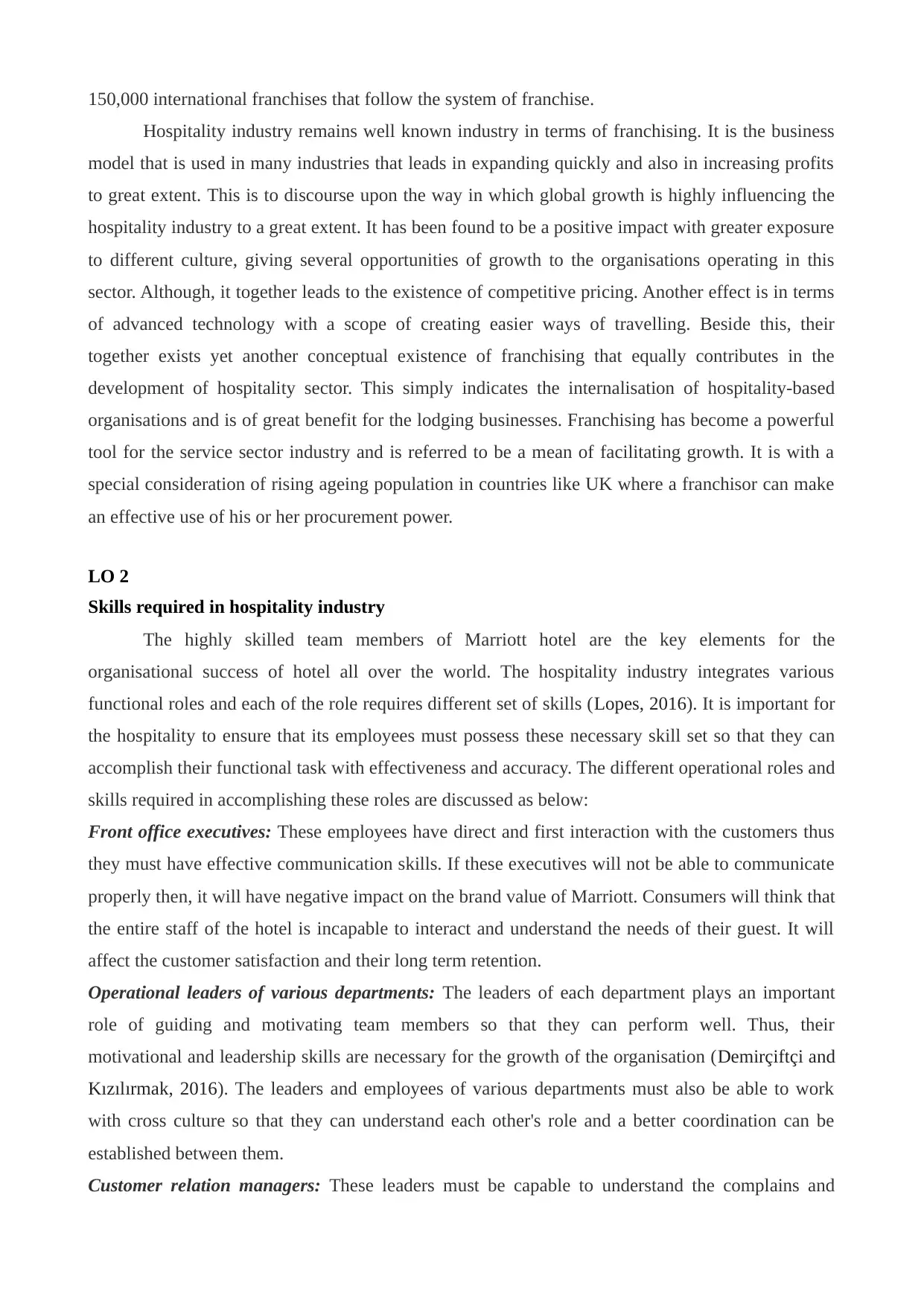
150,000 international franchises that follow the system of franchise.
Hospitality industry remains well known industry in terms of franchising. It is the business
model that is used in many industries that leads in expanding quickly and also in increasing profits
to great extent. This is to discourse upon the way in which global growth is highly influencing the
hospitality industry to a great extent. It has been found to be a positive impact with greater exposure
to different culture, giving several opportunities of growth to the organisations operating in this
sector. Although, it together leads to the existence of competitive pricing. Another effect is in terms
of advanced technology with a scope of creating easier ways of travelling. Beside this, their
together exists yet another conceptual existence of franchising that equally contributes in the
development of hospitality sector. This simply indicates the internalisation of hospitality-based
organisations and is of great benefit for the lodging businesses. Franchising has become a powerful
tool for the service sector industry and is referred to be a mean of facilitating growth. It is with a
special consideration of rising ageing population in countries like UK where a franchisor can make
an effective use of his or her procurement power.
LO 2
Skills required in hospitality industry
The highly skilled team members of Marriott hotel are the key elements for the
organisational success of hotel all over the world. The hospitality industry integrates various
functional roles and each of the role requires different set of skills (Lopes, 2016). It is important for
the hospitality to ensure that its employees must possess these necessary skill set so that they can
accomplish their functional task with effectiveness and accuracy. The different operational roles and
skills required in accomplishing these roles are discussed as below:
Front office executives: These employees have direct and first interaction with the customers thus
they must have effective communication skills. If these executives will not be able to communicate
properly then, it will have negative impact on the brand value of Marriott. Consumers will think that
the entire staff of the hotel is incapable to interact and understand the needs of their guest. It will
affect the customer satisfaction and their long term retention.
Operational leaders of various departments: The leaders of each department plays an important
role of guiding and motivating team members so that they can perform well. Thus, their
motivational and leadership skills are necessary for the growth of the organisation (Demirçiftçi and
Kızılırmak, 2016). The leaders and employees of various departments must also be able to work
with cross culture so that they can understand each other's role and a better coordination can be
established between them.
Customer relation managers: These leaders must be capable to understand the complains and
Hospitality industry remains well known industry in terms of franchising. It is the business
model that is used in many industries that leads in expanding quickly and also in increasing profits
to great extent. This is to discourse upon the way in which global growth is highly influencing the
hospitality industry to a great extent. It has been found to be a positive impact with greater exposure
to different culture, giving several opportunities of growth to the organisations operating in this
sector. Although, it together leads to the existence of competitive pricing. Another effect is in terms
of advanced technology with a scope of creating easier ways of travelling. Beside this, their
together exists yet another conceptual existence of franchising that equally contributes in the
development of hospitality sector. This simply indicates the internalisation of hospitality-based
organisations and is of great benefit for the lodging businesses. Franchising has become a powerful
tool for the service sector industry and is referred to be a mean of facilitating growth. It is with a
special consideration of rising ageing population in countries like UK where a franchisor can make
an effective use of his or her procurement power.
LO 2
Skills required in hospitality industry
The highly skilled team members of Marriott hotel are the key elements for the
organisational success of hotel all over the world. The hospitality industry integrates various
functional roles and each of the role requires different set of skills (Lopes, 2016). It is important for
the hospitality to ensure that its employees must possess these necessary skill set so that they can
accomplish their functional task with effectiveness and accuracy. The different operational roles and
skills required in accomplishing these roles are discussed as below:
Front office executives: These employees have direct and first interaction with the customers thus
they must have effective communication skills. If these executives will not be able to communicate
properly then, it will have negative impact on the brand value of Marriott. Consumers will think that
the entire staff of the hotel is incapable to interact and understand the needs of their guest. It will
affect the customer satisfaction and their long term retention.
Operational leaders of various departments: The leaders of each department plays an important
role of guiding and motivating team members so that they can perform well. Thus, their
motivational and leadership skills are necessary for the growth of the organisation (Demirçiftçi and
Kızılırmak, 2016). The leaders and employees of various departments must also be able to work
with cross culture so that they can understand each other's role and a better coordination can be
established between them.
Customer relation managers: These leaders must be capable to understand the complains and
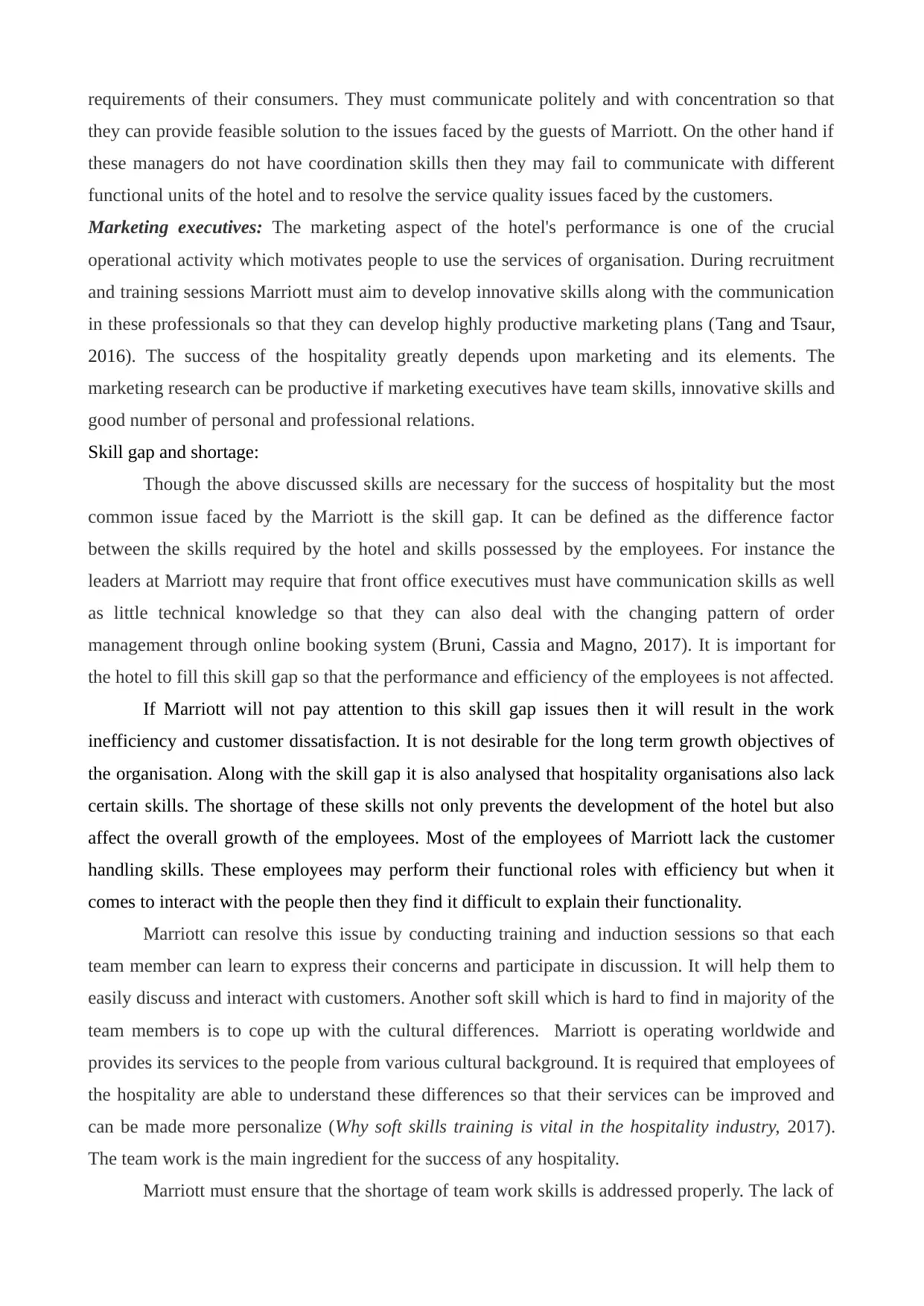
requirements of their consumers. They must communicate politely and with concentration so that
they can provide feasible solution to the issues faced by the guests of Marriott. On the other hand if
these managers do not have coordination skills then they may fail to communicate with different
functional units of the hotel and to resolve the service quality issues faced by the customers.
Marketing executives: The marketing aspect of the hotel's performance is one of the crucial
operational activity which motivates people to use the services of organisation. During recruitment
and training sessions Marriott must aim to develop innovative skills along with the communication
in these professionals so that they can develop highly productive marketing plans (Tang and Tsaur,
2016). The success of the hospitality greatly depends upon marketing and its elements. The
marketing research can be productive if marketing executives have team skills, innovative skills and
good number of personal and professional relations.
Skill gap and shortage:
Though the above discussed skills are necessary for the success of hospitality but the most
common issue faced by the Marriott is the skill gap. It can be defined as the difference factor
between the skills required by the hotel and skills possessed by the employees. For instance the
leaders at Marriott may require that front office executives must have communication skills as well
as little technical knowledge so that they can also deal with the changing pattern of order
management through online booking system (Bruni, Cassia and Magno, 2017). It is important for
the hotel to fill this skill gap so that the performance and efficiency of the employees is not affected.
If Marriott will not pay attention to this skill gap issues then it will result in the work
inefficiency and customer dissatisfaction. It is not desirable for the long term growth objectives of
the organisation. Along with the skill gap it is also analysed that hospitality organisations also lack
certain skills. The shortage of these skills not only prevents the development of the hotel but also
affect the overall growth of the employees. Most of the employees of Marriott lack the customer
handling skills. These employees may perform their functional roles with efficiency but when it
comes to interact with the people then they find it difficult to explain their functionality.
Marriott can resolve this issue by conducting training and induction sessions so that each
team member can learn to express their concerns and participate in discussion. It will help them to
easily discuss and interact with customers. Another soft skill which is hard to find in majority of the
team members is to cope up with the cultural differences. Marriott is operating worldwide and
provides its services to the people from various cultural background. It is required that employees of
the hospitality are able to understand these differences so that their services can be improved and
can be made more personalize (Why soft skills training is vital in the hospitality industry, 2017).
The team work is the main ingredient for the success of any hospitality.
Marriott must ensure that the shortage of team work skills is addressed properly. The lack of
they can provide feasible solution to the issues faced by the guests of Marriott. On the other hand if
these managers do not have coordination skills then they may fail to communicate with different
functional units of the hotel and to resolve the service quality issues faced by the customers.
Marketing executives: The marketing aspect of the hotel's performance is one of the crucial
operational activity which motivates people to use the services of organisation. During recruitment
and training sessions Marriott must aim to develop innovative skills along with the communication
in these professionals so that they can develop highly productive marketing plans (Tang and Tsaur,
2016). The success of the hospitality greatly depends upon marketing and its elements. The
marketing research can be productive if marketing executives have team skills, innovative skills and
good number of personal and professional relations.
Skill gap and shortage:
Though the above discussed skills are necessary for the success of hospitality but the most
common issue faced by the Marriott is the skill gap. It can be defined as the difference factor
between the skills required by the hotel and skills possessed by the employees. For instance the
leaders at Marriott may require that front office executives must have communication skills as well
as little technical knowledge so that they can also deal with the changing pattern of order
management through online booking system (Bruni, Cassia and Magno, 2017). It is important for
the hotel to fill this skill gap so that the performance and efficiency of the employees is not affected.
If Marriott will not pay attention to this skill gap issues then it will result in the work
inefficiency and customer dissatisfaction. It is not desirable for the long term growth objectives of
the organisation. Along with the skill gap it is also analysed that hospitality organisations also lack
certain skills. The shortage of these skills not only prevents the development of the hotel but also
affect the overall growth of the employees. Most of the employees of Marriott lack the customer
handling skills. These employees may perform their functional roles with efficiency but when it
comes to interact with the people then they find it difficult to explain their functionality.
Marriott can resolve this issue by conducting training and induction sessions so that each
team member can learn to express their concerns and participate in discussion. It will help them to
easily discuss and interact with customers. Another soft skill which is hard to find in majority of the
team members is to cope up with the cultural differences. Marriott is operating worldwide and
provides its services to the people from various cultural background. It is required that employees of
the hospitality are able to understand these differences so that their services can be improved and
can be made more personalize (Why soft skills training is vital in the hospitality industry, 2017).
The team work is the main ingredient for the success of any hospitality.
Marriott must ensure that the shortage of team work skills is addressed properly. The lack of
⊘ This is a preview!⊘
Do you want full access?
Subscribe today to unlock all pages.

Trusted by 1+ million students worldwide
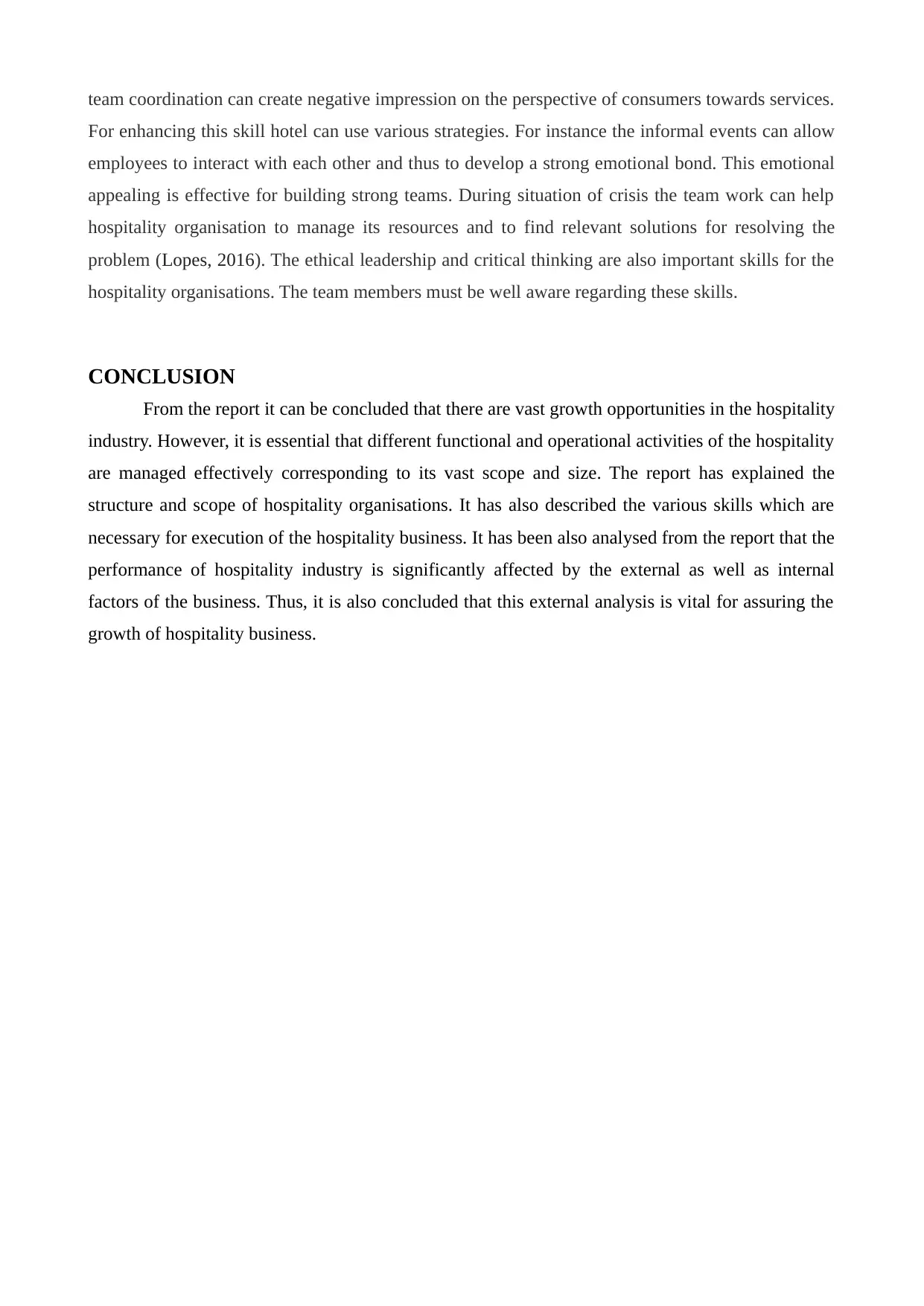
team coordination can create negative impression on the perspective of consumers towards services.
For enhancing this skill hotel can use various strategies. For instance the informal events can allow
employees to interact with each other and thus to develop a strong emotional bond. This emotional
appealing is effective for building strong teams. During situation of crisis the team work can help
hospitality organisation to manage its resources and to find relevant solutions for resolving the
problem (Lopes, 2016). The ethical leadership and critical thinking are also important skills for the
hospitality organisations. The team members must be well aware regarding these skills.
CONCLUSION
From the report it can be concluded that there are vast growth opportunities in the hospitality
industry. However, it is essential that different functional and operational activities of the hospitality
are managed effectively corresponding to its vast scope and size. The report has explained the
structure and scope of hospitality organisations. It has also described the various skills which are
necessary for execution of the hospitality business. It has been also analysed from the report that the
performance of hospitality industry is significantly affected by the external as well as internal
factors of the business. Thus, it is also concluded that this external analysis is vital for assuring the
growth of hospitality business.
For enhancing this skill hotel can use various strategies. For instance the informal events can allow
employees to interact with each other and thus to develop a strong emotional bond. This emotional
appealing is effective for building strong teams. During situation of crisis the team work can help
hospitality organisation to manage its resources and to find relevant solutions for resolving the
problem (Lopes, 2016). The ethical leadership and critical thinking are also important skills for the
hospitality organisations. The team members must be well aware regarding these skills.
CONCLUSION
From the report it can be concluded that there are vast growth opportunities in the hospitality
industry. However, it is essential that different functional and operational activities of the hospitality
are managed effectively corresponding to its vast scope and size. The report has explained the
structure and scope of hospitality organisations. It has also described the various skills which are
necessary for execution of the hospitality business. It has been also analysed from the report that the
performance of hospitality industry is significantly affected by the external as well as internal
factors of the business. Thus, it is also concluded that this external analysis is vital for assuring the
growth of hospitality business.
Paraphrase This Document
Need a fresh take? Get an instant paraphrase of this document with our AI Paraphraser
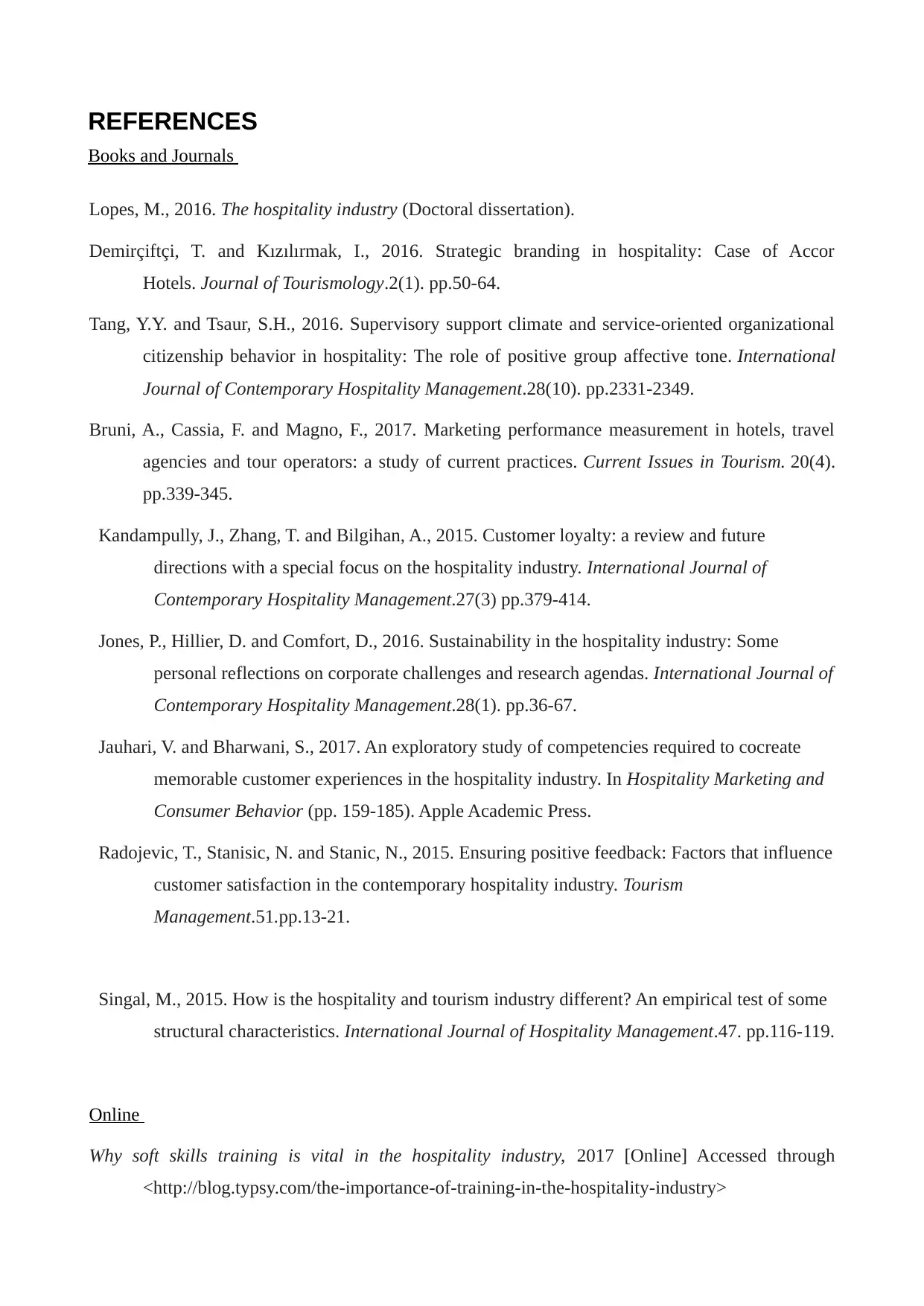
REFERENCES
Books and Journals
Lopes, M., 2016. The hospitality industry (Doctoral dissertation).
Demirçiftçi, T. and Kızılırmak, I., 2016. Strategic branding in hospitality: Case of Accor
Hotels. Journal of Tourismology.2(1). pp.50-64.
Tang, Y.Y. and Tsaur, S.H., 2016. Supervisory support climate and service-oriented organizational
citizenship behavior in hospitality: The role of positive group affective tone. International
Journal of Contemporary Hospitality Management.28(10). pp.2331-2349.
Bruni, A., Cassia, F. and Magno, F., 2017. Marketing performance measurement in hotels, travel
agencies and tour operators: a study of current practices. Current Issues in Tourism. 20(4).
pp.339-345.
Kandampully, J., Zhang, T. and Bilgihan, A., 2015. Customer loyalty: a review and future
directions with a special focus on the hospitality industry. International Journal of
Contemporary Hospitality Management.27(3) pp.379-414.
Jones, P., Hillier, D. and Comfort, D., 2016. Sustainability in the hospitality industry: Some
personal reflections on corporate challenges and research agendas. International Journal of
Contemporary Hospitality Management.28(1). pp.36-67.
Jauhari, V. and Bharwani, S., 2017. An exploratory study of competencies required to cocreate
memorable customer experiences in the hospitality industry. In Hospitality Marketing and
Consumer Behavior (pp. 159-185). Apple Academic Press.
Radojevic, T., Stanisic, N. and Stanic, N., 2015. Ensuring positive feedback: Factors that influence
customer satisfaction in the contemporary hospitality industry. Tourism
Management.51.pp.13-21.
Singal, M., 2015. How is the hospitality and tourism industry different? An empirical test of some
structural characteristics. International Journal of Hospitality Management.47. pp.116-119.
Online
Why soft skills training is vital in the hospitality industry, 2017 [Online] Accessed through
<http://blog.typsy.com/the-importance-of-training-in-the-hospitality-industry>
Books and Journals
Lopes, M., 2016. The hospitality industry (Doctoral dissertation).
Demirçiftçi, T. and Kızılırmak, I., 2016. Strategic branding in hospitality: Case of Accor
Hotels. Journal of Tourismology.2(1). pp.50-64.
Tang, Y.Y. and Tsaur, S.H., 2016. Supervisory support climate and service-oriented organizational
citizenship behavior in hospitality: The role of positive group affective tone. International
Journal of Contemporary Hospitality Management.28(10). pp.2331-2349.
Bruni, A., Cassia, F. and Magno, F., 2017. Marketing performance measurement in hotels, travel
agencies and tour operators: a study of current practices. Current Issues in Tourism. 20(4).
pp.339-345.
Kandampully, J., Zhang, T. and Bilgihan, A., 2015. Customer loyalty: a review and future
directions with a special focus on the hospitality industry. International Journal of
Contemporary Hospitality Management.27(3) pp.379-414.
Jones, P., Hillier, D. and Comfort, D., 2016. Sustainability in the hospitality industry: Some
personal reflections on corporate challenges and research agendas. International Journal of
Contemporary Hospitality Management.28(1). pp.36-67.
Jauhari, V. and Bharwani, S., 2017. An exploratory study of competencies required to cocreate
memorable customer experiences in the hospitality industry. In Hospitality Marketing and
Consumer Behavior (pp. 159-185). Apple Academic Press.
Radojevic, T., Stanisic, N. and Stanic, N., 2015. Ensuring positive feedback: Factors that influence
customer satisfaction in the contemporary hospitality industry. Tourism
Management.51.pp.13-21.
Singal, M., 2015. How is the hospitality and tourism industry different? An empirical test of some
structural characteristics. International Journal of Hospitality Management.47. pp.116-119.
Online
Why soft skills training is vital in the hospitality industry, 2017 [Online] Accessed through
<http://blog.typsy.com/the-importance-of-training-in-the-hospitality-industry>

⊘ This is a preview!⊘
Do you want full access?
Subscribe today to unlock all pages.

Trusted by 1+ million students worldwide
1 out of 9
Related Documents
Your All-in-One AI-Powered Toolkit for Academic Success.
+13062052269
info@desklib.com
Available 24*7 on WhatsApp / Email
![[object Object]](/_next/static/media/star-bottom.7253800d.svg)
Unlock your academic potential
Copyright © 2020–2026 A2Z Services. All Rights Reserved. Developed and managed by ZUCOL.




